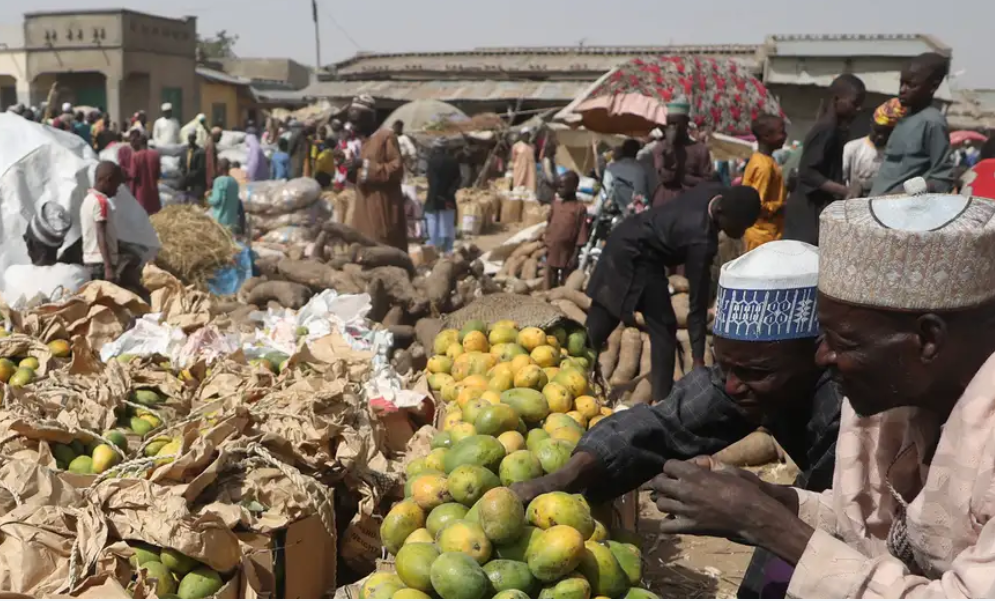Nigeria, a rich tapestry of cultures, resources, and potential, is suffocating under the vice grip of an astronomical cost of living. The bitter reality gnawing at the hearts of millions of Nigerians can be traced directly to the complacency and mismanagement characterized by Tinubu’s administration. As the price of essential commodities skyrockets and opportunities for economic growth plummet, it’s imperative to dissect how this administration’s failures have exacerbated human suffering and economic despair.
The Market Chaos
In the bustling markets of Lagos to the rural enclaves of Kaduna, the pervasive sense of disillusionment is palpable. The nation’s pulse is erratic, its rhythm disrupted by the daily struggles of its people to afford basic necessities. Under President Bola Tinubu’s guardianship, everyday Nigerians have found themselves grappling with life under an administration that has proven woefully inadequate at managing the challenges at hand.
Food prices have surged, fueled by reckless fiscal policies and neglect of the agricultural sector. Families that once enjoyed modest meals are now facing food insecurity, a harrowing descent into malnutrition and despair. The government’s lack of effective intervention has left farmers grappling with poor yields, while the average Nigerian endures runaway food costs driven by unchecked inflation.
Impact on Families
- Drastic reduction in the quality and quantity of meals.
- Increased cases of malnutrition, especially among children and the elderly.
- Heightened stress and anxiety within households unable to make ends meet.
The Fuel Crisis
Even more tragic is the fuel crisis that underscores the administrative incompetence. As oil-rich Nigeria staggers under fuel shortages and soaring prices, the impacts on personal transportation, logistics, and the broader economy are nothing short of devastating. Small businesses, the backbone of Nigeria’s economy, are starved of the affordable energy necessary to thrive. Commutes that were once routine now drain purses, creating an endless loop of economic stagnation and individual desperation.
Cost of Commutes and Businesses
- Increased transportation costs, making daily commutes unaffordable for many workers.
- Large-scale delays in goods delivery, impacting supply chains and retail markets.
- Small enterprises and startups facing closure due to exorbitant operational costs.
Healthcare and Educational Collapse
Healthcare and education—fundamental pillars of any thriving society—teeter on the brink of collapse. The administration’s failure to stabilize the economy has left government hospitals overcrowded and under-resourced, while many children remain deprived of quality education due to inflated tuition costs and crumbling infrastructure. The long-term consequences of these oversights are dire, promising a future where ailing health and inadequate education will cripple generations to come.
Impact on Public Services
- Overburdened hospitals struggling to provide basic medical care.
- Rising school dropout rates as families cannot afford educational expenses.
- Extensive brain drain, with skilled professionals seeking opportunities abroad.
Economic and Human Toll
The pain of these rising costs is not evenly spread. The vulnerable segments of society—the elderly, unemployed, and low-income families—bear the brunt of this neglect. Without robust social safety nets, the promise of a better tomorrow seems a hollow mirage. Tinubu’s administration’s reluctance to implement meaningful social welfare programs underscores a glaring disconnect between governance and the lived realities of the Nigerian populace.
Suffering the Most Vulnerable
- Elderly citizens unable to access pensions or healthcare support.
- Single-parent households facing insurmountable financial burdens.
- Youth unemployment rates soaring, leading to increased crime and social unrest.
Conclusion: A Call for Accountability
Nigeria’s current plight is a direct reflection of a leadership that has not only failed to meet the expectations of its citizens but has exacerbated their struggles. The responsibility lies squarely with Tinubu




